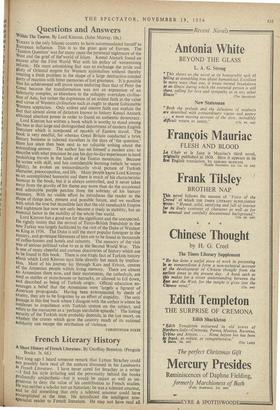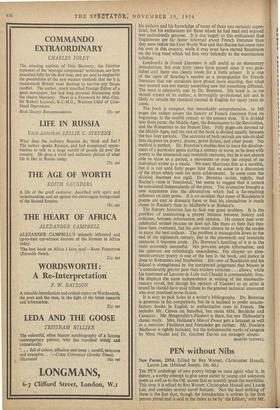French Literary History
NOT long ago I heard someone remark that • Lytton Strachey could aot possibly have read all the authors discussed in his Landmarks In French Literature. I have never cared for Strachey as a writer --I find his style irritating and the personality behind the books profoundly antipathetic—but it would be unjust as well as un- generous to deny the value of his contribution to French studies. He was neither a scholar nor an historian; he was a talented amateur, and he did something that only a talented amateur could have accomplished at the time. He introduced the intelligent non- specialist reader to French literature. He may not have read all his authors and his knowledge of many of them was certainly super- ficial, but his enthusiasm for those whom he had read and enjoyed was undoubtedly genuine. It is due largely to this enthusiasm that Englishmen aro far better informed about French literature than they were before the First World War and that Racine has come into his own in this country, while it may even have started Baudelaire on the long road which led him very belatedly to the examination syllabus.
Landmarks In French Literature is still useful as an elementary introduction, but over forty years have passed since it was pub- lished and there was clearly room for a fre§h primer. It is one of the signs of Strachey's success as a propagandist for French literature that our standards have gfown more exacting, that what was wanted was not merely something new but something different. The need is admirably met by Dr. Brereton. His book is, as we should expect of its author, a thoroughly professional job and is likely to remain the standard manual in English for many years to come.
The book is compact, but remarkably comprehensive. In 340 pages the author covers the history of French literature from its beginnings in the twelfth century to the present time. It is divided into three parts: the Middle Ages, the Renaissance to the Revolution, and the Romantics to the Present Day. Fifty pages are devoted to the Middle Ages, and the rest of the book is divided equally between the two later periods. The accounts of both periods are sub-divided into chapters on poetry, drama, prose fiction, and other prose. No method is perfect. Dr. Brereton's enables him to trace the develop- ment of a particular genre during a century or more, as he does with poetry in the nineteenth and twentieth centuries, but he is not always able to show us a period, a movement or even the output of an individual writer as a whole. We meet Marivaux first as a novelist, but it is not until forty pages later that we come to a discussion of the plays which were his main achievement. In some cases the division becomes too rigid. Dr. Brereton insists, rightly, that Racine's verse is 'functional,' but seems to suggest that it cannot be considered independently of the plays. The dramatists brought a new suppleness into the alexandrine which had a far-reaching influence on later poets. It is no accident that many of Baudelaire's poems are cast in dramatic form or that his alexandrine is much closer to Racine's than to Malherbe's or Boileau's.
The literary historian has to face one great problem. It is the problem of maintaining a proper balance between history and criticism, between information and opinion. He cannot pass over celebrated writers' because he does not like them or feels that they have been overrated, but his aim must always be to help the reader to enjoy the best authors. The problem is manageable down to the end of the eighteenth century, but in the nineteenth and twentieth centuries it becomes acute. Dr. Brereton's handling of it is in the main extremely successful. His provides ample information, and his opinions are refreshingly unacademic. His chapter on nine- teenth-century poetry is one of the best in the book, and justice is done to Romantics and Symbolists. His view of Baudelaire and his School is strengthened by the unexpected judgement that Musset is 'a considerably greater poet than modern criticism . . . allows,' while his treatment of Leconte de Lisle and Claudel is commendably firm. He displays the same independence in writing of the nineteenth- century novel, but though his opinion of Flaubert as an artist is sound he should have paid tribute to the greatest technical innovator who ever practised prose fiction.
It is easy to pick holes in a writer's bibliography. Dr. Brereton is generous to his compatriots, but he is inclined to prefer unsatis- factory books in English to authoritative ones in French. He includes Mr. Clewes on Stendhal, but omits MM. Bard6che and Caraccio. Mr. Steegmuller's Flaubert is there, but not Thibaudet's classic study. Mrs. Haldane's Marcel Proust gets a bouquet as well as a mention: Feuillerat and Fernandez get neither. Mr. Fowlie's Mallarme is rightly included, but the indispensable works of exegesis by Mme Noulet find Dr. Gardner Davies are strangely absent.
MARTIN TURNELL











































































 Previous page
Previous page